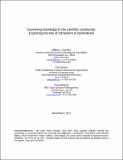Governing knowledge in the scientific community: Exploring the role of retractions in biomedicine
Author(s)
Furman, Jeffrey L.; Jensen, Kyle; Murray, Fiona E.
DownloadMurray_Governing knowledge.pdf (393.1Kb)
PUBLISHER_CC
Publisher with Creative Commons License
Creative Commons Attribution
Terms of use
Metadata
Show full item recordAbstract
Although the validity of knowledge is critical to scientific progress, substantial concerns exist regarding the governance of knowledge production. While research errors are as relevant to the knowledge economy as defects are to the manufacturing economy, mechanisms to identify and signal “defective” or false knowledge are poorly understood. In this paper, we investigate one such institution – the system of scientific retractions. We analyze the universe of peer-reviewed scientific articles retracted from the biomedical literature between 1972–2006 and comparing with a matched control sample in order to identify the correlates, timing, and causal impact of scientific retractions. This effort provides insight into the workings of a distributed, peer-based system for the governance of validity in scientific knowledge. Our findings suggest that attention is a key predictor of retraction – retracted articles arise most frequently among highly-cited articles. The retraction system is expeditious in uncovering knowledge that is ever determined to be false (the mean time to retraction is less than two years) and democratic (retraction is not systematically affected by author prominence). Lastly, retraction causes an immediate, severe, and long-lived decline in future citations. Conditional on the obvious limitation that we cannot measure the absolute amount of false science in circulation, these results support the view that distributed governance systems can be designed to uncover false knowledge relatively swiftly and to mitigate the costs that false knowledge for future generations of producers.
Date issued
2012-01Department
Harvard University--MIT Division of Health Sciences and Technology; Sloan School of ManagementJournal
Research Policy
Publisher
Elsevier
Citation
Furman, Jeffrey L., Kyle Jensen, and Fiona Murray. “Governing Knowledge in the Scientific Community: Exploring the Role of Retractions in Biomedicine.” Research Policy 41, no. 2 (March 2012): 276–290.
Version: Author's final manuscript
ISSN
00487333